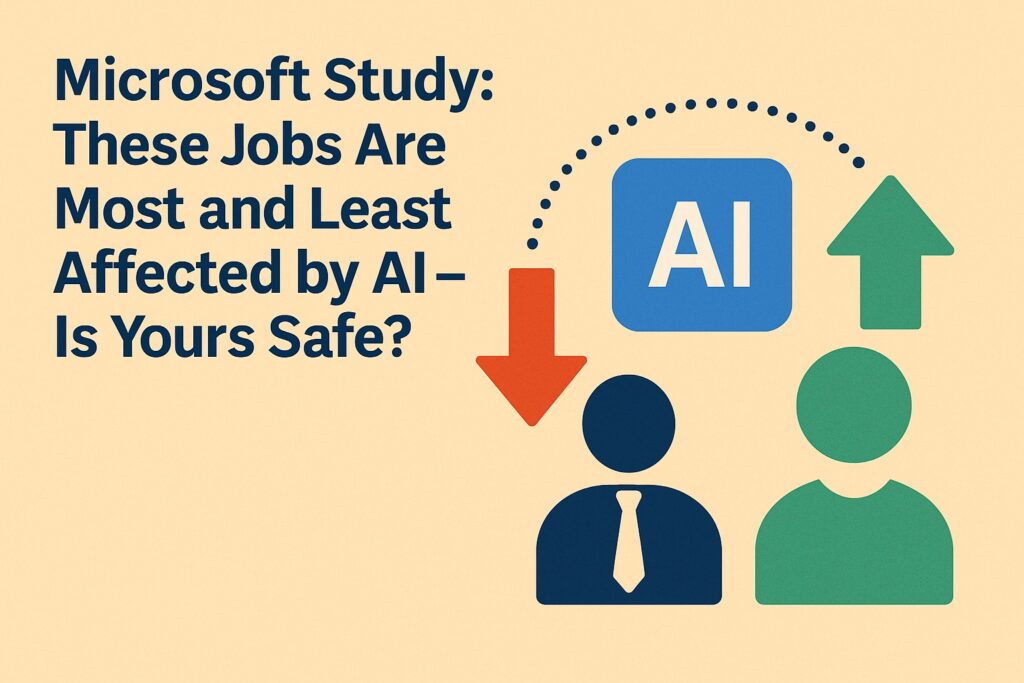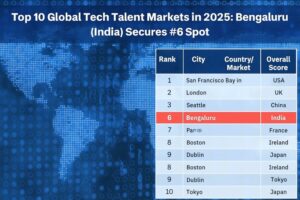Microsoft Study: These Jobs Are Most and Least Affected by AI – Is Yours Safe?

Microsoft Study: These Jobs Are Most and Least Affected by AI – Is Yours Safe?
As artificial intelligence (AI) continues reshaping industries, a pressing question looms: Which jobs are being transformed the most, and which remain relatively untouched?
A recent study from Microsoft Research offers fresh insights. By analyzing over 200,000 anonymized user interactions with Bing Copilot, researchers developed an AI Applicability Score—a metric that measures how closely AI capabilities align with specific job roles.
“The study doesn’t suggest AI will fully replace any profession,” said Microsoft researcher Kiran Tomlinson, “but it does highlight where AI can change how work is performed.”
Jobs Most Affected by AI
The study found that occupations involving communication, writing, data analysis, or research show the greatest overlap with AI tools. These roles often involve tasks that AI, especially large language models, can now assist with or automate.
Top Roles at Risk of Transformation:
- Editors
- Interpreters & Translators
- Data Scientists
- Journalists & News Analysts
- PR Specialists
- Customer Service Representatives
- Writers & Authors
- Web Developers
- Technical Writers
- Market Research Analysts
- Sales Representatives (Services)
- Proofreaders & Copy Markers
- Concierges
- Political Scientists
- Broadcast Announcers & DJs
- Financial Advisors
- Management Analysts
- Advertising Sales Agents
- Library Science Professors
- Mathematicians
- Business Teachers
- Economists
- Statisticians
- Telephone Operators
- Geographers
- Models
While these roles are not being eliminated, AI is already helping automate key tasks—drafting reports, composing emails, generating content, or handling customer queries. In many cases, this may enhance productivity, but it could also shift or reduce certain job responsibilities.
Jobs Least Affected by AI
On the other end, professions that require hands-on labor, real-world interactions, or empathy are far less vulnerable to automation. These roles typically rely on physical skills, manual precision, or personal care—areas where current AI technologies fall short.
Jobs Least Likely to Be Impacted:
- Nursing Assistants
- Surgical Assistants
- Phlebotomists
- Massage Therapists
- Roofers
- Cement Masons
- Production Helpers
- Dishwashers
- Water Treatment Operators
- Gas Compressor Operators
- Firefighter Supervisors
- Machine Operators & Feeders
- Paving Equipment Operators
- Automotive Glass Installers
- Tire Repairers
- Oil & Gas Roustabouts
- Embalmers
- Ophthalmic Technicians
- Oral & Maxillofacial Surgeons
- Prosthodontists
These roles demand human presence, tactile skills, or emotional intelligence—qualities that AI has yet to match. Experts believe they are among the most resilient as AI adoption accelerates.
Key Takeaway:
While AI is becoming a powerful workplace tool, not all jobs face equal risk. Microsoft’s study doesn’t predict wholesale job losses but rather emphasizes how tasks within roles may evolve. As AI continues advancing, the future of work will likely favor human-AI collaboration over direct replacement.












